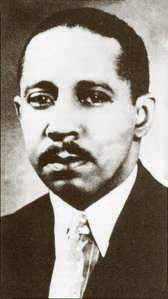

Queer Places:
Assistens Cemetery,
Copenhagen, Kobenhavns Kommune, Hovedstaden, Denmark
 Porter Grainger (October 22, 1891 − c. 1955; fl New York) was
an American pianist, songwriter, playwright, and music publisher.
Bessie
Smith's biographer, Chris Albertson, portrays Grainger as a homosexual. He
dressed elegantly in the high fashion of the day, with spats, a walking stick,
fancy hats, and fine suits. Smith was aware of his sexual preferences, but she
reportedly seduced him a couple of times.
Porter Grainger (October 22, 1891 − c. 1955; fl New York) was
an American pianist, songwriter, playwright, and music publisher.
Bessie
Smith's biographer, Chris Albertson, portrays Grainger as a homosexual. He
dressed elegantly in the high fashion of the day, with spats, a walking stick,
fancy hats, and fine suits. Smith was aware of his sexual preferences, but she
reportedly seduced him a couple of times.
When Grainger was born in Bowling Green, Kentucky, the Granger family name did not include an "i". Although the exact date at which Grainger changed his name is unknown, he registered for the World War I draft by signing his name "Grainger". At that time, he was living in Chicago,[1] and by 1916, his professional career had begun.[2] In the spring of 1920 he left Chicago for New York City, and by 1924, he was living in Harlem.[1] Working with another pianist and composer Bob Ricketts, in 1926, Grainger wrote and published the book How to Play and Sing the Blues Like the Phonograph and Stage Artists.[3] The 1925 New York City Telephone book lists "Grainger & Ricketts", songwriters, at 1547 Broadway, New York.
Though he would never really be known as an exceptional soloist in his own right,[2] Grainger nevertheless thrived as an accompanist, working with singers such as Fannie May Goosby,[4] Viola McCoy, Clara Smith, and Victoria Spivey. From 1924 to 1928, he worked with blues singer Bessie Smith to record more than a dozen sides for Columbia Records. Amongst the height of his career was the 1928 stage production, Mississippi Days, which also featured Smith.[5]
He was also Mamie Smith's accompanist in the 1929 film short Jailhouse Blues and regularly appeared with her in stage shows.[1] Other female blues singers he wrote songs for included Gladys Bryant, Dolly Ross, Ada Brown, and his own wife, Ethel Finnie.[5]
As a bandleader, Grainger also made eight recordings. Four of these records, made with his ensemble the Get Happy Band, are of special interest to collectors of early jazz, as these albums featured performances by Sidney Bechet (soprano saxophone), as well as by Joe "Tricky Sam" Nanton (trombone) (Duke Ellington sidemen), and Elmer Snowden (banjo). "(In) Harlem's Araby" also appeared on these recordings. The composition was co-written with Jo Trent and Thomas "Fats" Waller, and is still considered one of Grainger's best works.[1]
His last known recording appears to have been in 1932, although he performed and composed into the 1940s. His latter years remain mysteriously murky, although a copyright renewal application for the How to Play and Sing the Blues book was filed in his name in 1954.[3]
My published books: